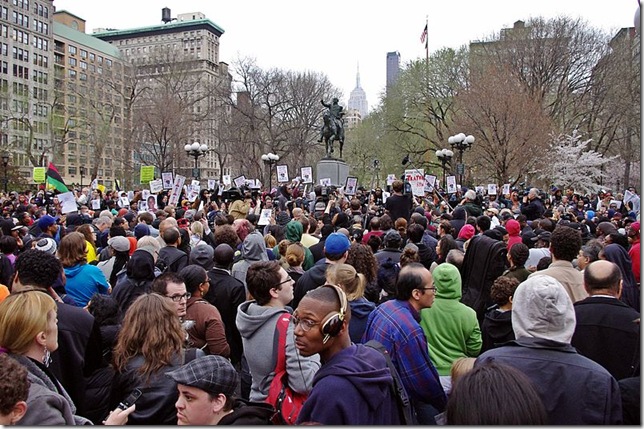By Myles Ludwig
I had really hoped today would be a NoZimZone.
I had hoped to be free of this issue — this murder or manslaughter, this fear and self-defense, this profiling as prejudice — but no such luck. As soon as I woke up and turned on my TV, the first thing I saw was the news of George Zimmerman’s acquittal and his tragic involvement with Trayvon Martin. As the late Susan Sontag observed, “the camera makes everyone a tourist in other people’s reality, and eventually in one’s own.”
The punishment of others, physical or mental, is part of our civilization; nothing new here except the medium. We don’t have to buy a ticket to the Coliseum or hang out in the square to cheer.
I’ve written about the spectacle of trials and cultural concepts of justice before, but because they have come to occupy such an increasingly large niche in our mediaverse — “lighting up social media, “as various TV commentators say — I am starting to look for a frame to understand the experience in a different way.
I am coming to think it serves the purpose of a collective religious experience, a kind of social purification.
The televised trial allows us to worship in the church of abstractions without leaving the comforts of our homes. We can be happily ensconced in our own remote world, reclining in our La-Z-Boy pews while the trial provides an on-screen altar on which we can lay our beliefs for testing, profess our faith in the mysterious and unknown, confess our failures, and seek audience absolution for the sins we hide from ourselves and others. We can offer up a human sacrifice or two and our thirst is temporarily satisfied.
These trials are, turning to Sontag again, “the nearest thing to a sacramental human activity acknowledged by secular society.”
Why else involve ourselves in the pain and tragedy of others? To enjoy that spectacle, to see it as entertainment or food for kitchen table conversation seems a sacrilege, even pornographic. It must be because we know we are quite capable of the same transgressions and we harbor the driving but unspoken fear that we too might easily slip the bonds of civilization and commit some terrible act. We know we are only a hair’s-breadth away from being both accused and victim. We know that the verdict frees us from judging ourselves. It expiates our guilt.
Hungry for revelations, every sect, every contingent finds its own support in the liturgy while our public commentators, our highly paid media priests, are like vultures picking away at the still-fresh bodies to find and digest and regurgitate every morsel of meaning.
Media executives proclaim that televised trials are good for business. And they say this without shame. They’re good because each one is like a mini-series: each one has a prologue, a beginning, a middle, a denouement, an end and an epilogue — all the traditionally engaging narrative components of drama.
Even “post-game analysis,” as Chris Cuomo called it.
Sontag again: “The course of modern history having already sapped the traditions and shattered the living wholes in which precious objects once found their place, the collector may now in good conscience go about excavating the choicer, more emblematic fragments.”
And televised trials have the advantage of being controversial at their core. It seems that we can take sides with impunity, that we can be Tony Soprano or Savonarola in our mind.
But can we really see ourselves as innocent bystanders?
As psychologist Marshall Rosenberg, a respected proponent of non-violent conflict resolution, has remarked, “all violence is the result of people tricking themselves into believing that their pain derives from other people and that consequently those people deserve to be punished.”
External solutions to internal problems.
I think Sophocles has the last word on this: “The greatest griefs are those we cause ourselves.”
